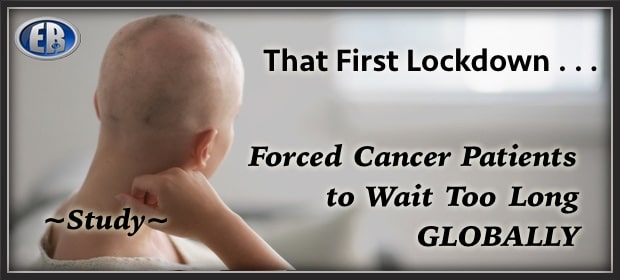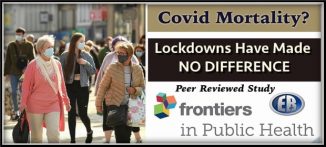
Restrictions Resulted in “a Consistent Global Drop In Access to Cancer Care”, According to New Review of 69 Studies
LOCKDOWN SCEPTICS
A review of 69 studies from across the world has found that there was “a consistent global drop in access to cancer care” – both for adults and for children – during the first wave of Covid due to the restrictive measures introduced by governments.
The review, led by Carl Heneghan, Jon Brassey, and Tom Jefferson for Collateral Global, highlights that late-stage cancer presentations (which are linked to decreased survival rates for certain cancers) increased because of delays to screenings, diagnoses, waiting lists and treatments during lockdowns, as well as after restrictions were lifted.
In an editorial based on their review, Carl Heneghan (Professor of Evidence-Based Medicine at Oxford) and Tom Jefferson (an epidemiologist and expert on respiratory diseases) present the findings from various studies on changes to cancer services due to government-imposed restrictions.
From mid-March until the end of April 2020, a cervical cancer screening unit in Cameroon saw screening numbers drop by nearly 80%. This is troubling because late-stage presentations are linked to decreased cervical cancer survival. The five-year survival rate for U.S. women diagnosed with advanced cervical cancer is 15% compared with 93% for those presenting much earlier with localised disease. A similar outcome is seen in low-income countries. In India, for example, the five-year survival is 9% for advanced disease compared with 78% when the cancer is diagnosed at stage one when it is localised to the cervix.
Several studies in our review reported that when routine services resumed after restrictions were lifted, there was still a shift to later-stage disease presentations, even in countries that were relatively unaffected by the pandemic.
In a Japanese regional treatment centre, no significant changes were seen in the number of patients undergoing surgery. However, the number of patients undergoing surgery with advanced disease increased compared with before the emergency. In three university-affiliated hospitals in Korea, the number of cancers diagnosed remained the same; however, the proportion of patients with stage three-four non-small-cell lung cancer (NSCLC) increased to 75% compared to an average of 63% in the three previous years.
Not all cancers have the same prognosis but presenting late with lung cancer is bad news. In those with early disease, more than 55 out of 100 people will survive for five years or more after diagnosis. But in later stage four disease – which has spread beyond the lungs – only five out of 100 survive for five years or more.
In low resource settings, delays had lethal effects. Among Indian patients presenting to a tertiary care hospital with oral cancers, 39% were deemed inoperable in the early three months of the Covid pandemic – double the number compared with the pre-Covid era.
These delays in care were not restricted to adults as children were affected in a variety of countries. In Turkey, a major Paediatric Oncology Department reported reductions in children undergoing chemotherapy, radiotherapy, surgery, and imaging studies during the Covid period. In Italy, presentations to the National Pediatric Oncology Unit in Milan during the lockdown phase were half of what would normally be expected. And in a U.S. tertiary referral centre, 75% of new leukaemia/lymphoma diagnoses required intensive care in April 2020 compared with a monthly average of 12% in 2018–2019.
Patients with cancer often delay seeking medical advice. The early phase of the COVID-19 pandemic substantially exacerbated these delays. The true extent of the impact of these delays may never be known. However, a substantial body of evidence reports that delays lead to later-stage cancer, which translates into more severe disease and subsequently reduces life expectancy. Low and middle-income countries are disproportionately affected by cancer, where more than two-thirds of all global deaths occur.
Worth reading in full.
The full review can be found here.

••••
The Liberty Beacon Project is now expanding at a near exponential rate, and for this we are grateful and excited! But we must also be practical. For 7 years we have not asked for any donations, and have built this project with our own funds as we grew. We are now experiencing ever increasing growing pains due to the large number of websites and projects we represent. So we have just installed donation buttons on our websites and ask that you consider this when you visit them. Nothing is too small. We thank you for all your support and your considerations … (TLB)
••••
Comment Policy: As a privately owned web site, we reserve the right to remove comments that contain spam, advertising, vulgarity, threats of violence, racism, or personal/abusive attacks on other users. This also applies to trolling, the use of more than one alias, or just intentional mischief. Enforcement of this policy is at the discretion of this websites administrators. Repeat offenders may be blocked or permanently banned without prior warning.
••••
Disclaimer: TLB websites contain copyrighted material the use of which has not always been specifically authorized by the copyright owner. We are making such material available to our readers under the provisions of “fair use” in an effort to advance a better understanding of political, health, economic and social issues. The material on this site is distributed without profit to those who have expressed a prior interest in receiving it for research and educational purposes. If you wish to use copyrighted material for purposes other than “fair use” you must request permission from the copyright owner.
••••
Disclaimer: The information and opinions shared are for informational purposes only including, but not limited to, text, graphics, images and other material are not intended as medical advice or instruction. Nothing mentioned is intended to be a substitute for professional medical advice, diagnosis or treatment.




